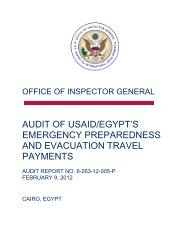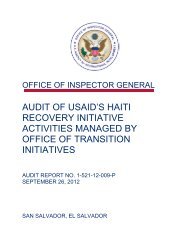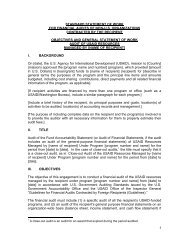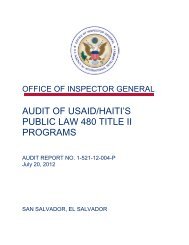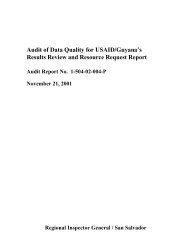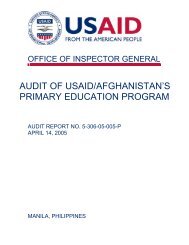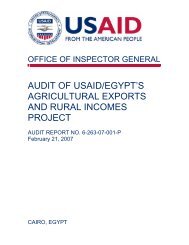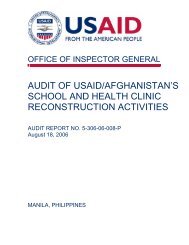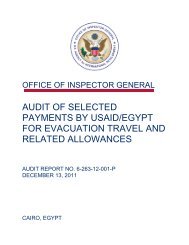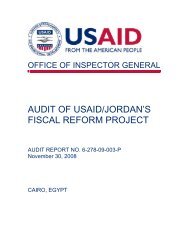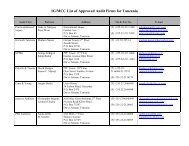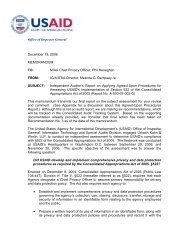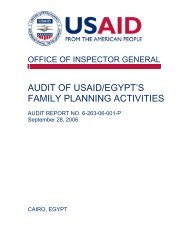USAID OIG Afghanistan and Pakistan Oversight Report, April-June ...
USAID OIG Afghanistan and Pakistan Oversight Report, April-June ...
USAID OIG Afghanistan and Pakistan Oversight Report, April-June ...
- No tags were found...
You also want an ePaper? Increase the reach of your titles
YUMPU automatically turns print PDFs into web optimized ePapers that Google loves.
The objective of the audit was to determine whether <strong>USAID</strong>/<strong>Afghanistan</strong>’s program was achieving its maingoals of strengthening the Government of the Islamic Republic of <strong>Afghanistan</strong>’s ability to provide healthservices to its citizens <strong>and</strong> train competent teachers by constructing provincial hospitals, midwife trainingcenters, <strong>and</strong> provincial teacher training colleges.While the mission had realized some successes—for example, in strengthening the capacity of localconstruction companies <strong>and</strong> adhering to the international building code—the program was not on scheduleto achieve its main goals. Construction fell significantly behind schedule. The program was approximately18 months behind schedule <strong>and</strong> was making slow progress toward achieving its goals. Cost <strong>and</strong> securityissues reduced the scope of new construction. Achievement of the original goals of the agreement washindered by funding limitations. Federal requirements also were violated when the mission approved thebuilding of religious structures. IOM’s technical proposal clearly indicated that these religious structureswould be incorporated into the designs of the provincial teacher training colleges, but <strong>USAID</strong> staff failed torecognize these structures as being ineligible for <strong>USAID</strong> funding.The audit disclosed several instances of noncompliance with IOM’s quality control manual, which isincorporated into the cooperative agreement <strong>and</strong> approved by the mission. The manual required specifictests of construction materials to be performed at specified intervals, but in some cases there was noevidence that required tests had been performed. For example, of 49 cases auditors reviewed in which 7-day concrete compression strength tests were required, IOM could only provide evidence that 35 wereperformed.Additionally, facility sustainability was questionable. The ability of the Ministries of Education <strong>and</strong> PublicHealth to maintain completed structures was questionable because of competing priorities for ministryfunds, which could further hinder achievement of the program’s main goals.Review of <strong>USAID</strong>/<strong>Afghanistan</strong>’s Bank Supervision Assistance Activities <strong>and</strong> the Kabul Bank Crisis(<strong>Report</strong> No. F-306-11-003-S, March 16, 2011)Since 2003, <strong>USAID</strong>/<strong>Afghanistan</strong> has supported a number of capacity-building activities at the <strong>Afghanistan</strong>Central Bank (DAB) to help DAB regulate the banking sector. Deloitte provided DAB technical assistance inbank supervision <strong>and</strong> examination through a $92 million task order under the Economic Growth <strong>and</strong>Governance Initiative. The purpose of the task order was to increase <strong>Afghanistan</strong>'s ability to develop <strong>and</strong>implement sound economic <strong>and</strong> regulatory policies that provide the foundation for private sector growth ina market economy. According to Deloitte's work plan, one of the main goals was to assist DAB in fulfilling itsstatutory responsibilities—to promote the stability <strong>and</strong> contribution to economic growth of the financialsector <strong>and</strong> to prevent avoidable losses. Deloitte provided onsite technical advisers at DAB’s Directorate forFinancial Supervision.After depositors’ run on Kabul Bank, senior officials in the U.S. Embassy raised concerns about Deloitte’sperformance. Specifically, they were concerned that Deloitte staff did not warn the U.S. Government aboutlooming problems at Kabul Bank before the first news reports broke in February 2010. They alsoquestioned Deloitte’s effectiveness <strong>and</strong> performance because Deloitte staff had provided bank supervisionassistance to DAB for 7 years, yet DAB supervisors were unable to prevent the near collapse of <strong>Afghanistan</strong>'slargest bank. In January 2011, <strong>USAID</strong>/<strong>Afghanistan</strong> requested <strong>OIG</strong> assistance in determining whether <strong>USAID</strong>or Deloitte staff members were negligent in failing to report Kabul Bank fraud.74 <strong>USAID</strong> <strong>OIG</strong> <strong>Afghanistan</strong> <strong>and</strong> <strong>Pakistan</strong> <strong>Oversight</strong> <strong>Report</strong>



